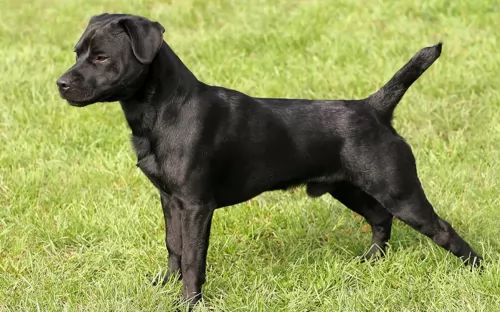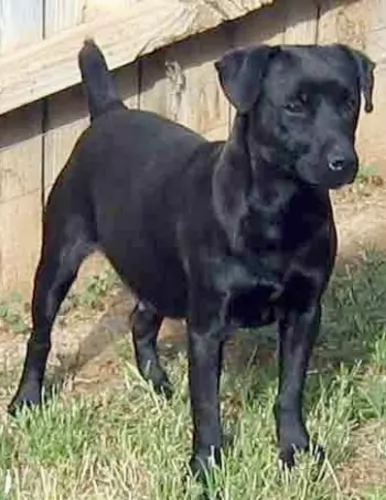 Petzlover
Petzlover Both Lancashire Heeler and Patterdale Terrier are originated from United Kingdom. Lancashire Heeler may grow 9 cm / 3 inches shorter than Patterdale Terrier. Both Lancashire Heeler and Patterdale Terrier are having almost same weight. Both Lancashire Heeler and Patterdale Terrier has almost same life span. Both Lancashire Heeler and Patterdale Terrier has same litter size. Both Lancashire Heeler and Patterdale Terrier requires Low Maintenance.
Both Lancashire Heeler and Patterdale Terrier are originated from United Kingdom. Lancashire Heeler may grow 9 cm / 3 inches shorter than Patterdale Terrier. Both Lancashire Heeler and Patterdale Terrier are having almost same weight. Both Lancashire Heeler and Patterdale Terrier has almost same life span. Both Lancashire Heeler and Patterdale Terrier has same litter size. Both Lancashire Heeler and Patterdale Terrier requires Low Maintenance.
 The Lancashire Heeler, known also as the Ormskirk Heeler or Ormskirk Terrier, hails from England and is looked upon as a vulnerable breed by the Kennel Club in the 21st century.
The Lancashire Heeler, known also as the Ormskirk Heeler or Ormskirk Terrier, hails from England and is looked upon as a vulnerable breed by the Kennel Club in the 21st century.
He was developed to be a cattle drover, but is essentially a companion dog today. Exact details of the origin of the Lancashire are unknown, but it is generally accepted that Welsh Corgis were used as well as a kind of black and tan terrier known as the Manchester Terrier.
In England, he has been known as a general working dog for more than a century.Gwen Mackintosh began breeding these dogs in the 1960s and the Lancashire Heeler Club was established in 1978. The dog was also placed on the Endangered Breeds in 2003.
 The Patterdale was developed in England,with his origins being linked to an early breeder with the name Joe Bowman.
The Patterdale was developed in England,with his origins being linked to an early breeder with the name Joe Bowman.
They were sought after for their prowess at guarding sheep from foxes. The dog was recognized by the United Kennel Club in 1995. It is believed the dog is descended from the Northern terrier breeds and can be traced far back.
 As a small breed dog, the Lancashire Heeler stands at 25 – 31cm in height, both male and female, and the dog weighs in the region of 2 to 6kg.
As a small breed dog, the Lancashire Heeler stands at 25 – 31cm in height, both male and female, and the dog weighs in the region of 2 to 6kg.
Looking quite similar to a Corgi or a German Shepherd with short legs, the Heeler’s legs are meant to be fairly straight and not bandy-legged. He has a short, weather-proof coarse coat that can be black or liver-colored, with tan markings. The coat is regarded as low maintenance. The hair is slightly longer around his neck.
The ears are erect, the eyes brown and bright and the tail these days is left long with a slight curl.
Intelligent, stubborn, strong willed, playful and friendly, the Lancashire Heeler is capable of making you an excellent pet and companion.
This dog is smart and learns quickly. He is energetic and playful, strong and robust and more than willing to take part in all the activities that you’re taking part in.
With training and socialization he makes a splendid pet, but he doesn’t put up well to abuse and disrespect from younger children. He is willing to get along with other pets in the home too.
 The Patterdale Terrier is a small sized dog that stands at between 25 and 40 cm in height and weighs 5 to 7kg.
The Patterdale Terrier is a small sized dog that stands at between 25 and 40 cm in height and weighs 5 to 7kg.
The coat of the dog can be smooth, broken or rough, but all coats are double and weatherproof. Colors include red, liver, black, bronze, black and tan or chocolate and sometimes brindle. The ears are floppy and medium length and the tail is also medium length and held high, curving slightly. It used to be docked and then ¼ to 1/3 of the tail was removed.
The Patterdale Terrier is small but he is bold and confident and very energetic. He will certainly need to be in a household where the family members are active, busy people. Because he is strong-willed he will benefit from training and socialization which will make him obedient and able to behave well in different situations.
 As with any dog breed, there are wide variations in temperament. A dog essentially turns out the way it was brought up, similar to a child. Angry, harsh, aggressive, uncaring dog owners produce a dog that is both timid and aggressive, unsure, frustrated and with behavioral problems.
As with any dog breed, there are wide variations in temperament. A dog essentially turns out the way it was brought up, similar to a child. Angry, harsh, aggressive, uncaring dog owners produce a dog that is both timid and aggressive, unsure, frustrated and with behavioral problems.
Make your dog part of your family, provide him with good food, exercise and love and he will make an awesome pet.
The Lancashire Heeler is such an amicable, social dog at heart, and treated well, he will turn out like is inherent characteristics. He is an outgoing, friendly dog, more so when he has been trained and socialized. He will adapt to city- or country life, so long as he is exercised each day.
The Heeler has a good, balanced temperament, and counted in as a loved family member, you’ll make sure he stays that way.
 Intelligent, courageous and feisty, the Patterdale Terrier is a dog that will get on well with everyone in the house. Those who are active and outdoor types will be the best kind of dog owners for this active, energetic dog.
Intelligent, courageous and feisty, the Patterdale Terrier is a dog that will get on well with everyone in the house. Those who are active and outdoor types will be the best kind of dog owners for this active, energetic dog.
The Patterdale is confident and strong willed and will do superbly well with some training and socialization. With lots of love and care, your Patterdale Terrier can make you an excellent family pet and companion.
 Your Heeler can live to be 14, 15 or 16 years of age and live even longer than this with the right care. He is such a healthy breed, but one of the common dog illnesses to look out for are eye diseases.
Your Heeler can live to be 14, 15 or 16 years of age and live even longer than this with the right care. He is such a healthy breed, but one of the common dog illnesses to look out for are eye diseases.
This is where the ligaments of the eye are weakened so that the lens actually loosened and then displaced, causing pain for the dog. This displacement can obstruct fluid drainage from the eye too and your vet may need to perform surgery.
The shock-absorbing intervertebral discs can have spinal compression and contribute to significant pain for your pet. Early signs will see your Lancashire Heeler being reluctant to jump on his chair like he may once have done. Preventing obesity is important for reducing pressure on the dog’s spine.
 The good news is that terriers have few health problems and they can live to a ripe age. Just like other dogs, they can also battle with some of the common dog ailments there are.
The good news is that terriers have few health problems and they can live to a ripe age. Just like other dogs, they can also battle with some of the common dog ailments there are.
Most allergens are foods, medicines or insects and exposure to the allergen can cause an over-reaction. In a dog, the most common symptom associated with allergies is itching of the skin. It can drive your pet mad as he licks and bites his skin. The symptoms of allergies can involve the respiratory system and he will have coughing and sneezing or even a discharge from the eyes.
Your Patterdales can also develop cataracts and glaucoma – two kinds of eye diseases. Glaucoma can unfortunately lead to blindness but something can be done if you recognize the signs. There are 2 main types of canine glaucoma, characterized by pressure inside the eye which can do damage to the retina and optic nerve – primary- and secondary glaucoma. Your vet will try to determine whether your pet has primary or secondary glaucoma to determine treatment.
 Known as a low maintenance dog, the Lancashire Heeler’s short coat will require little grooming, just a good brush twice a week.
Known as a low maintenance dog, the Lancashire Heeler’s short coat will require little grooming, just a good brush twice a week.
If your Heeler doesn’t wear his nails down naturally, they will need to be clipped as part of the grooming process. Ears should also be checked regularly. Excess wax and dirt can build up which can lead to an ear infection. This can drive your dog mad with frustration. Teeth also need to be brushed regularly.
Remember, if you feel guilty for not getting to grooming your pet, there are professional groomers at your local vet or who work independently and they will do all of this for you.
Your Lancashire Heeler is such a social, active little dog who is always willing to be counted in to all your fun and games. If you’re lucky to have a fair sized garden, involve him in some ball games, or use a rope for him to tug on while you pull the other side. Whenever you go for a walk, he will be thrilled to join you as he loves picking up all those new scents outside his garden.
Nutritious food is important for longevity and health in a dog. Every dog has different dietary needs throughout their lives – when they’re puppies, when the female is pregnant, after they’ve been spayed or neutered, as a working dog, when they’re sick, when they’re old and so on.
There are some good dog brand foods to use, but you want to choose the best ones to ensure your dog gets all the vitamins and minerals needed as opposed to those that are packed with colorants, preservatives and fillers.
Home-made food is important too and some cooked chicken, cooked rice and raw or cooked vegetables can be added to his dry kibble from time to time. Don’t complicate your dog’s diet – just feed him plain, wholesome food like this with a little bit of raw meat added in occasionally. Simple, nutritious food will ensure he is energetic, bright eyed and happy. Make sure he always has fresh, cool water.
 Your Patterdale Terrier has a lot of energy, so as a responsible dog owner, you will need to see that he is exercised properly. This will include a walk every day as well as spending time throwing balls or a frisbee for him. He is a working breed and has been used to being mentally and physically stimulated.
Your Patterdale Terrier has a lot of energy, so as a responsible dog owner, you will need to see that he is exercised properly. This will include a walk every day as well as spending time throwing balls or a frisbee for him. He is a working breed and has been used to being mentally and physically stimulated.
The Patterdale Terrier isn’t a high maintenance dog and his coat will simply require a brush twice a week. Your pet can’t tell you about any pain he is experiencing so you will need to watch his body language.
Dogs can easily pick up an ear infection and this can be very painful. When you brush your pet, check inside his ears for signs of redness and discharge and check inside his mouth to see if you can spot any rotten teeth. Bad teeth can wreak havoc on his health. Keep the nails trimmed.
If you intend feeding your pet commercially manufactured food, good and well because it is a convenient way to feed your pet, but make sure its a quality food. This will ensure your dog is getting in the right amount of vitamins and minerals.
To vary his diet just a bit, provide him with some home-made food such as boiled chicken, brown rice or pasta, and some wholesome vegetables such as carrots, spinach and sweet potato. Dogs love the simplicity and nutritional value of food like this, and they don't have to worry about getting a stomach ache from strange foods. Try and include some raw meat into the kibble from time to time as well.
Never leave your Paatterdale Terrier without a constant supply of fresh cool water.